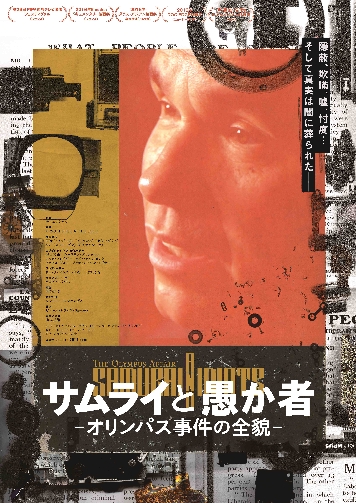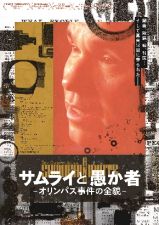Wednesday, April 04, 2018, 19:00 - 21:30
Reassessing one of Japan's biggest-ever corporate governance scandals - although not its last
Sneak Preview Screening:
"Samurai and Idiots – The Olympus Affair (Samurai to Orokamono - Olympus Jiken no Zembo)"
followed by a Q&A session with director Hyoe Yamamoto and documentary cast members
Yoshimasa Yamaguchi, Jonathan Soble and Waku Miller
Wednesday, April 4 at 7:00 pm

In Japanese and English, with English subtitles
Japan/ France/ Germany/ Sweden/ Denmark, 2015 79 minutes
Director: Hyoe Yamamoto
Executive Producers: Nick Fraser, Kazuyoshi Okuyama
Producer: Luc Martin Gousset
Film courtesy of Uzumasa/ English version provided by Vesuvius
On April 19, 2012, corporate whistleblower Michael Woodford appeared at FCCJ, just a day before his former employer's annual shareholders meeting. "The Olympus scandal would have been a wonderful opportunity to really get it right," he told the enormous crowd of reporters. "All they've done is make it worse. Olympus may get away with it, and the institutional shareholders, after sweating tomorrow, may be fine with it. But the damage is done. Would you invest in Japan? Do you believe in the integrity of company accounts?"
In this engrossing case study of a film - which is finally being released in Japan some 3 years after its heralded UK premiere, and some 5 years after Olympus was fined 700 million yen (6 million dollars) and its three top executives plead guilty to massive accounting fraud - Woodford and other eyewitnesses demystify one of the biggest corporate governance debacles in postwar Japan. Watching it all unfold, as "Samurai and Idiots" forensically peels back layers of the onion to reveal more rot within, is jaw-dropping stuff, particularly in light of Toshiba’s similar profit-padding scandal in 2015, which resulted in a lawsuit by foreign investors and ongoing reverberations. (Plus ça change...)
In October 2011, Woodford had become the first non-Japanese appointed CEO of the multibillion-dollar optical firm, having "exceeded expectations" as Olympus president and COO for six months. Just two weeks later, he was at the center of a widening uproar, having gone public when the board ousted him rather than answer his questions about 1.7 billion dollars in fees that Olympus paid to and for "Mickey Mouse" companies (some with ties to organized crime), apparently to hide old losses.
Woodford had been tipped off by a series of articles written by Yoshimasa Yamaguchi in the bravely independent news magazine Facta. Woodford gave his own inside scoop to former Financial Times reporter Jonathan Soble the same day he was fired; and while Japan's press toed the Olympus line (the foreign CEO had "failed to overcome cultural differences and communications difficulties" and "ignored the hierarchy"), the truth began exploding across global business pages.
The rest is history. "Samurai and Idiots" traces the unfolding mystery from its beginnings, as the East-West cultural showdown grew ever more polarizing, until the corporate malefactors were finally arrested. Through it all, the film asks a question of continuing concern today: With the incestuous relationship between company executives, auditors, government officials and the media in Japan, and with the constraints on investigative journalism, just how many dark secrets may never come to light?
Join us for this sneak preview of "Samurai and Idiots," which opens in May in Japan, and stay on for what is sure to be a rousing discussion.
For more (in Japanese): http://www.samurai2018.com
HYOE YAMAMOTO studied filmmaking at the Tisch School of the Arts at New York University. His short fiction films have screened at Tribeca, Rotterdam and many other international film festivals. "Samurai and Idiots - The Olympus Affair" marks his feature debut. He runs his own production company, Vesuvius, and is currently working with Aljazeera on a documentary about tattooing in Japan.
YOSHIMASA YAMAGUCHI worked as an analyst at Rating & Investment Information, Inc. before he became a freelance journalist. He writes for Facta, Gendai Business and many other publications.
JONATHAN SOBLE has been a correspondent for the New York Times and the Financial Times, where he served as Tokyo bureau chief until 2014. A graduate of Columbia University Graduate School of Journalism, he is currently a visiting fellow at the Asia Pacific Initiative.
WAKU MILLER established Lapis Works in 1988 and writes industrial newsletters and magazine articles, translates nonfiction books and is a published author in Japanese. He entered the Buddhist priesthood in 2009.
You may attend the Q&A without attending the screening, but you will not have seating priority. Please reserve in advance, still & TV cameras inclusive, at the FCCJ Reception Desk (3211-3161) or register below. All film screenings are private, noncommercial events primarily for FCCJ members and their guests.
- Karen Severns, Film Committee


